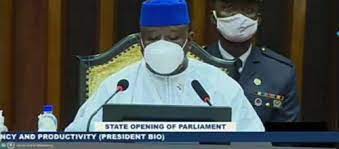President Dr Julius Maada Bio has outlined remarkable improvements in affordable and quality healthcare in his state opening of parliament address, indicating that healthcare infrastructure investments have increased significantly through collaboration with partners.
“Our commitment to affordable and quality healthcare aligns with the global call for Universal Health Coverage. Building on the successes of the past five years, we have leveraged health financing through partnerships with the World Bank, Global Fund, and FCDO, among others, implementing schemes to reduce patient out-of-pocket costs” he said during his address on Tuesday.
“We have recruited 5,000 healthcare workers, increased the number of doctors to over 600, and invested in capacity building to improve healthcare efficiency. Training on new procedures, deploying new technologies to support disease detection, diagnosis, and patient management and ensuring the delivery of essential medicines and supplies to reach the last mile users have enhanced our national health system” he said.
President Bio also updated on the Public-Private Cost Recovery Pilot Scheme and mobile medical services through Hospitals-On-Wheels, confirming that the efforts had further reduced healthcare costs for patients.
He added that his government’s partnership with Mercy Ships had also provided 5,000 free surgeries to citizens with other public-private projects ongoing.
“Healthcare infrastructure investments have increased significantly through collaboration with partners, including JICA, Partners in Health (PIH), and the UAE Government. We are rehabilitating 16 Government Hospitals and have completed a new hospital in Jojoima, a 110-bed field hospital in Port Loko, and the 142-bed Julius Maada Bio Paediatric Centre of Excellence in Lumley, Freetown.
“Additional projects include constructing the Waterloo Hospital, the 166-bed Hospital Centre of Excellence in Kono, a new midwifery school in Kenema, therapeutic oxygen plants, regional laboratory facilities, the rehabilitation of the obstetric fistula operating theatre in Bo and installing solar electrification at 6 Hospitals and 200 Peripheral Health Units (PHUs).
“Our healthcare initiatives have led to significant improvements in child and maternal health. Sierra Leone has met the 80% global standard for Special Care Baby Units in every district, with survival rates at these facilities at 87%. Special Care Baby Units will soon be extended to the remaining two districts, Karene and Falaba. New programmes focused on reducing child mortality and maternal mortality rates have been established.
“Introducing the first WHO-approved malaria vaccine (1.7 million doses are available until 2025) and routine HPV vaccinations for girls aged ten have strengthened our health outcomes,” he stated.
The event at the Sierra Leone parliament was marked by a lively and enthusiastic atmosphere, drawing a diverse and significant attendance.
Parliamentarians, government ministers, members of the diplomatic corps, local leaders, and a large crowd of citizens filled the well of parliament to hear President Julius Maada Bio address the second session of the sixth parliament.
His speech resonated with the audience, as it not only celebrated past successes but also inspired confidence and hope for continued progress. The detailed roadmap for future initiatives showcased a forward-thinking vision aimed at fostering national growth and development, garnering strong support and enthusiasm from those in attendance.
WN/as/APA


